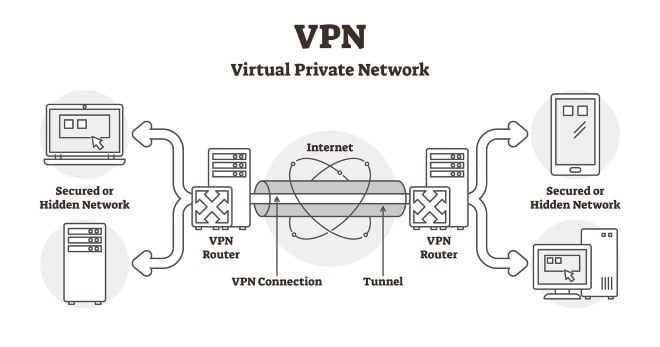Why You Need VPN And RDP When Your Employees Work From Home
 The work landscape has changed remarkably in just a couple of months. Most companies have been left scrambling to make this new trend of remote work more efficient for everyone while providing the same level of security as before.
The work landscape has changed remarkably in just a couple of months. Most companies have been left scrambling to make this new trend of remote work more efficient for everyone while providing the same level of security as before.
Your office probably has a variety of cyber threat protections set up to deter would-be hackers from accessing all of your sensitive information. Problem is, with the current pandemic, most of your employees are working from home where there are no such safeguards in place.
How then can you keep your employees working securely and effectively without any loss of company data?
VPN and RDP: What They Are and What They Do
Two such answers come in the form of VPN and RDP. VPN stands for virtual private network, while RDP stands for remote desktop protocol. Both of these will allow you to assume the identity of another computer when you work online.
Most people confuse VPN and RDP with each other because they share some similarity, but there are major differences between the two. A VPN application encrypts and decrypts your traffic while you surf the web, enabling anonymity with regards to your internet service provider (ISP) and location.
An RDP, meanwhile, allows you to access a remote device (in this instance, your office computer) over the web from your home computer. By giving you access to all applications installed on that remote device, an RDP software will let you retrieve and use all work files stored in your office PC from the confines of your home.
To make it easier to understand, let’s put it this way:
- A VPN makes you look like you are using another server in another location (which you choose).
- An RDP allows you to access all the files and applications stored on a particular computer as if you are right there in front of it.
Advantages of Using VPN and RDP for Remote Working
The advantages of using a VPN or an RDP for your employees who are working from home are many.
A VPN will:
- Keep your company data secure, private, and away from prying eyes. VPNs provide an enhanced level of security through encrypted connections and web anonymity.
- Allow you to bypass bandwidth throttling, so you can surf the web freely without affecting your speed.
- Let even the most non-techie person use it easily because a VPN connection can be set up through a simple click of a button.
- Allow your work group to share files securely for an extended period.
- Reduce costs, because once a VPN network is created, there isn’t much maintenance needed.
An RDP offers:
- Easy access to remote computers in your work network, since all you need to connect is that computer’s credentials.
- Work flexibility, because you can connect to your office computer from wherever you are located in the world.
- Free usage. Most Windows-based computers come with the Microsoft Remote Desktop software already installed. Mac users can have it installed by downloading the application from the Mac App Store. You don’t pay a single cent.
- All of the information you have stored in your work computer within your grasp in just one click. You can access all this data by connecting your work computer with any device, including a Windows phone.
For industries that are transmitting highly sensitive data, the use of both becomes even more imperative. When combined together, these two applications can be extremely powerful tools for remote work because they complement each other.
Here’s an example of what we’re talking about: remote employees for a medical agency providing telehealth services can utilize a VPN to share sensitive client data across a secure and efficient network while also using a RDP to access their office desktop, therefore working in a much more effective manner.
However, latency may be a concern for people using VPNs and RDPs over a satellite internet connection. Though satellite connections are high latency, VPNs and RDPs require low-latency to function properly, which can reduce data speed by as much as 75%.
Using the example of the medical agency we provide above, this lag in functionality can cause significant problems for patients needing immediate care and assessment via telehealth. However, the security provided by VPNs and RDPs, particularly during a time of heightened cyber attacks, is invaluable. In addition, Varay can provide work-around solutions where the latency penalty is reduced without compromising network security.
Make remote work more efficient for your company.
We at Varay specialize in providing customized IT solutions. We will help you set up a secure and structured platform to make working from home as convenient and cost-effective as possible. Let us show you how it’s done. Contact us now for a consultation.



